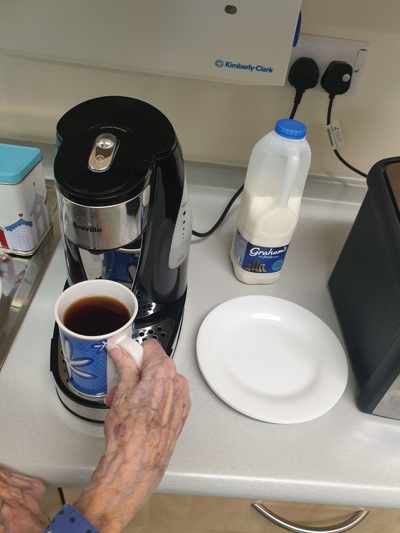
There are 6 community rehabilitation teams across Fife based within our community hospitals. These are:
- Adamson Hospital
- Glenrothes Hospital
- Queen Margaret Hospital
- Randolph Wemyss Memorial Hospital
- St Andrews Hospital
- Whyteman’s Brae Hospital
What is community rehabilitation?
If you have been in the Victoria Hospital Kirkcaldy, Ninewells Hospital in Dundee or any of our community hospitals and need to be discharged following surgery, an illness, injury, or stroke, you may require ongoing community rehabilitation once you return home or to a homely setting. If you are struggling at home with your mobility and day-to-day activities, your GP or health care professional may suggest a period of rehabilitation at home.
If community rehabilitation is appropriate for you then you will be referred to one of our community hospital teams for community rehabilitation. We are a short-term rehabilitation service that provide individual assessment and treatment programmes to promote independence and self-management. Frequency of visits will be dependent on individual assessment and need. The community rehabilitation teams do not provide home care. The aim of community rehabilitation is to ensure that you have the best chance of achieving your personal goals, improving your independence, general health and wellbeing and quality of life, whilst in your own home or homely setting. We strive to support your transition from hospital to home as early possible and prevent any unnecessary admission to hospital.
What should I expect?
A referral is likely to come from the therapists in the hospital if you’ve had an admission and from your GP or other healthcare professional if you are struggling at home. The therapist will work with you to create a treatment programme that will help you achieve your personal goals and that might be in relation to your mobility, functional independence, and confidence. It may also involve learning new skills, such as adaptive techniques, using equipment to support transfers (like on/off the toilet) or using a walking aid to help you walk.
The Physiotherapist will work with you to improve things such as muscle strength, balance, co-ordination, and mobility. The Occupational Therapist will work with you to improve your functional independence and the ability to perform everyday tasks such as dressing, bathing, meal preparation and leisure/social activities. Our healthcare support workers can continue practicing your programme with you to build your confidence and ability to self-manage.
Throughout your programme there will be a regular reviews/updates regarding your progress that will involve you and your family if you wish. Discussions will be focused the progression of meeting your goals and planning your discharge from the team. We work very closely with health and social care colleagues, and other professionals may be referred to as appropriate with your consent.
Referral
Referrals are made to the SPOA (Single Point of Access) from GPs and/or healthcare professionals. Please note that you cannot self refer to this service.
Your care team
Our teams are multi-professional, and you may likely meet a few members of the team including Physiotherapists, Occupational Therapists, assistant practitioners, and health care support workers.



